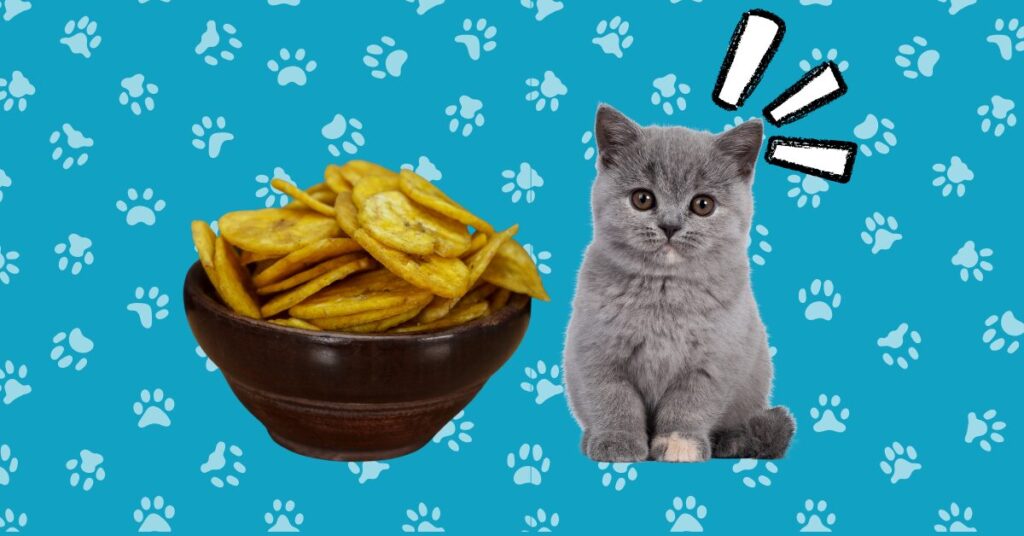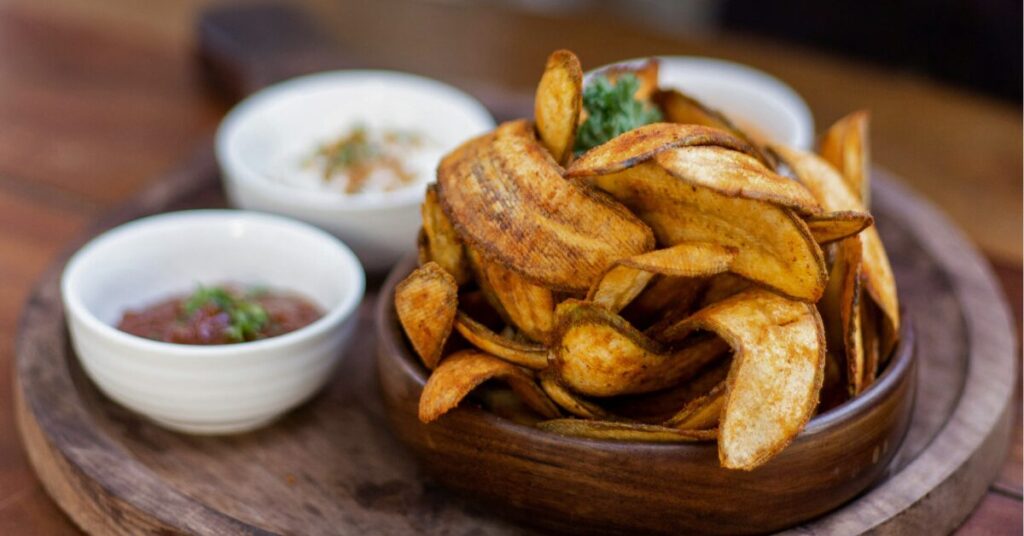
Banana chips are a trendy treat and are prepared by either frying or dehydrating slices of bananas. Preparation methods determine their flavor and texture. Dehydrated chunks tend to deliver more fruit and dietetic value.
Most often, these chips can be enjoyed as a standalone snack or as a garnish for desserts and cereals. They are offered in several flavors: sweetened, salted, or spiced. While they are appreciated by many people, it is important to know their nutritional value before offering them to your cats.
Can Cats Eat Banana Chips?
NO. Despite being a delicious treat for humans, banana chips are not good for cats, as they contain a high amount of sugar and fat.
Analysis of Ingredients
Bananas
In general, bananas are not harmful to cats but should only be consumed in small portions. This fruit does contain some nutritional value in the form of potassium, which helps maintain a healthy heart and muscle but cats however cannot eat too many carbohydrates and so their consumption must be restricted.
Oil and Fat Content
Fried banana chips are high in fat which may lead to some problems regarding digestion and weight gain of cats. Although fat is a source of energy, its surplus consumption can lead to obesity which is becoming common in pet cats.
Added Sugars and Preservatives
Cats are not meant to have sugar nor any type of artificial preservatives. Both additives are not beneficial and can lead to obesity or teeth related issues. Some preservatives have been shown to be harmful in the long run.

Potential Risks of Feeding Banana Chips to Cats
Immediate Effects
Gastrointestinal Issues
If your cat snacks on banana chips, they may have an upset stomach, nausea, or diarrhea. In such a case, removing banana chips from the diet and keeping a watch on your cat is recommended. In several cases, visiting a vet would be a good idea.
Allergic Reactions
While the number is low, it is possible for some cats to have an allergy to banana chips. Signs include skin scratches, some form of swelling, or even difficulty in breathing. If you suspect your kitty is having an allergic reaction, do book an appointment with your vet.
Long-Term Health Concerns
Obesity and Weight Gain
Banana chips are rich in fats and sugar which may lead to gaining weight. The issue of obesity in cats may develop into diabetes and other joint issues as well. Preventive measures include regular activities and healthy nutrition.
Diabetes
Cats can develop diabetes in the same manner as people do, and feeding them sweet snacks is one major reason for it. Increased thirst and urination, weight loss, and lethargy are some of the symptoms. Monitoring your cat’s dietary needs while seeking routine examinations from your veterinarian are important methods of intervention.
Dental Health
A diet full of sugars can damage your cat’s oral health by increasing the risk of cavities and gum diseases. These problems can be avoided by regular vet visits and by practicing good oral care.
Toxicity from Additives
Over the years, artificial preservatives have been thought to have toxicity risks. Some studies indicate a direct relationship between additives and health issues which raises caution while choosing cat snacks.
What to Do If Your Cat Eats Banana Chips

Immediate Actions
Don’t panic; instead, take a close look at your cat. Observe the cat for abnormal signs such as vomiting or any other strange activity. In such a scenario, it is prudent to consult your veterinarian. In some cases, they may suggest bringing the cat to the clinic, particularly when the symptoms don’t go away.

Nutritional Needs of Cats
Essential Nutrients
Cats are obligate carnivores that have specialized dietary requirements. Obligate carnivores means their diet is rich in meat which contains protein and fat. Proteins consist of amino acids which are vital in maintaining body tissues as well as their functions while fats help provide body energy and nurture the brain. Some other essential vitamins and minerals, such as taurine, Vitamin A, calcium, must also be included for a well-rounded feline diet.
Foods to Avoid
There are a number of human foods that are bad for cats. Onion, garlic, chocolate, and caffeine contains dangerous substances that are adverse to feline health. These foods can cause significant problems like gastrointestinal upset, or anemia.
Healthy Treat Alternatives for Cats
Store-Bought Options
There are lots of healthy snacks in stores which are made specifically for the diets of cats. Foods high in protein and which do not contain any harmful substances are the best ones. Brands such as Wellness Kittles or Blue Buffalo Wilderness are what to look for since they are rated highly.
Safe Human Foods
There are some human foods that are safe and even good for cats. Cats can be offered small amounts of cooked chicken, plain turkey, and salmon which have good levels of protein and no bad ingredients. But remember to serve these only in moderation and without any seasonings or sauces.

